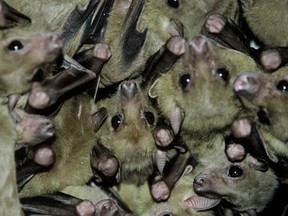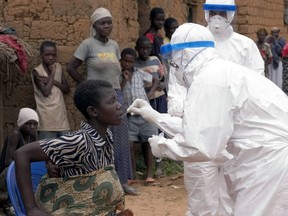Another Dread Zoonotic Surfacing in Africa
"Marburg is a highly infectious viral hemorrhagic fever in the same family as the more well-known Ebola virus disease.""In 2008, two independent cases were reported in travellers who visited a cave inhabited by Rousettus bat colonies in Uganda."World Health Organization"WHO is on the ground supporting health authorities [in Ghana where the latest outbreak has occurred] and now that the outbreak is declared, we are marshalling more resources for the response."Dr.Matshidiso Moeti, Regional Director for Africa, World Health Organization
 |
In 1967 two cases of the disease occurred, one in Marburg and Frankfurt, Germany, the other in Belgrade, Serbia. This is the origin of the naming of the virus; Marburg. The cases were traced back to a laboratory working with African green monkeys that had been imported from Uganda. The WHO reports that prolonged exposure to mines or caves where colonies of bats live can result in human infection.
The Ghana Health Service's Disease Surveillance Department recommends certain steps in avoidance of contracting the virus; abstaining from consuming bush meat; washing hands frequently with soap and water, and taking care not to handle dead bodies of those who may have had the Marburg virus. Timely and sterling recommendations for Africa, should outbreaks continue to be confined to that continent.
The suspected causes and such exposure leading to a virus leaping the species barrier from wild animals to humans has a familiar ring to it for most people; it was at the live animal market in Wuhan, China, that transmission from animal [bats infecting commonly consumed mammals] to human took place; bush animals sold for human consumption, infected with SARS-CoV-2 transmitted it to people at large through contact in the Huanan market.
 |
Marburg virus is more vindictively fatal than COVID-19; an estimated 88 percent of those infected may never recover. It has an incubation period between two to 14 days. Infection can spread from person to person through direct contact with bodily fluids. Clothing which has been worn by someone infected with Marburg can also become a source of infection. No cure exists for the virus, though treatment for its symptoms is available.
Symptoms of infection include high fever and severe headaches, muscle aches and pains. Severe diarrhea, stomach pain, nausea and vomiting may begin on the infection's third day. Those infected become extremely lethargic. In cases that become fatal, a patient generally bleeds from the nose and gums.
Marburg virus cases and outbreaks have been reported in Angola, Democratic Republic of Congo, Kenya, South Africa and Uganda with links to Zimbabwe. In 2021 an outbreak was declared in Guinea, lasting for five weeks following a single case of the virus.
Out of the 590 people who contracted the disease since 1957, 478 died of it, according to the World Health Organization's data on major outbreaks. Two deaths occurred in June in Ghana when two unrelated people died in hospital following their hospitalization because they were suffering from diarrhea, fever, nausea and vomiting.
 |
| Doctor Mark Katz, a member of the World Health Organisation (WHO), taking an oral sample from patient Feliciana suspected of having Marburg haemorrhagic fever in Kinguangua, near Uige. Feliciana’s grandmother, sister and ex-husband died of Marburg haemorrhagic fever. The young woman tested negative after being transported to the Uige Provincial Hospital for observation. Photo by CHRISTOPHER BLACK/AFP/Getty Images |
Labels: Africa, Marburg Virus Outbreaks, World Health Organization

0 Comments:
Post a Comment
<< Home